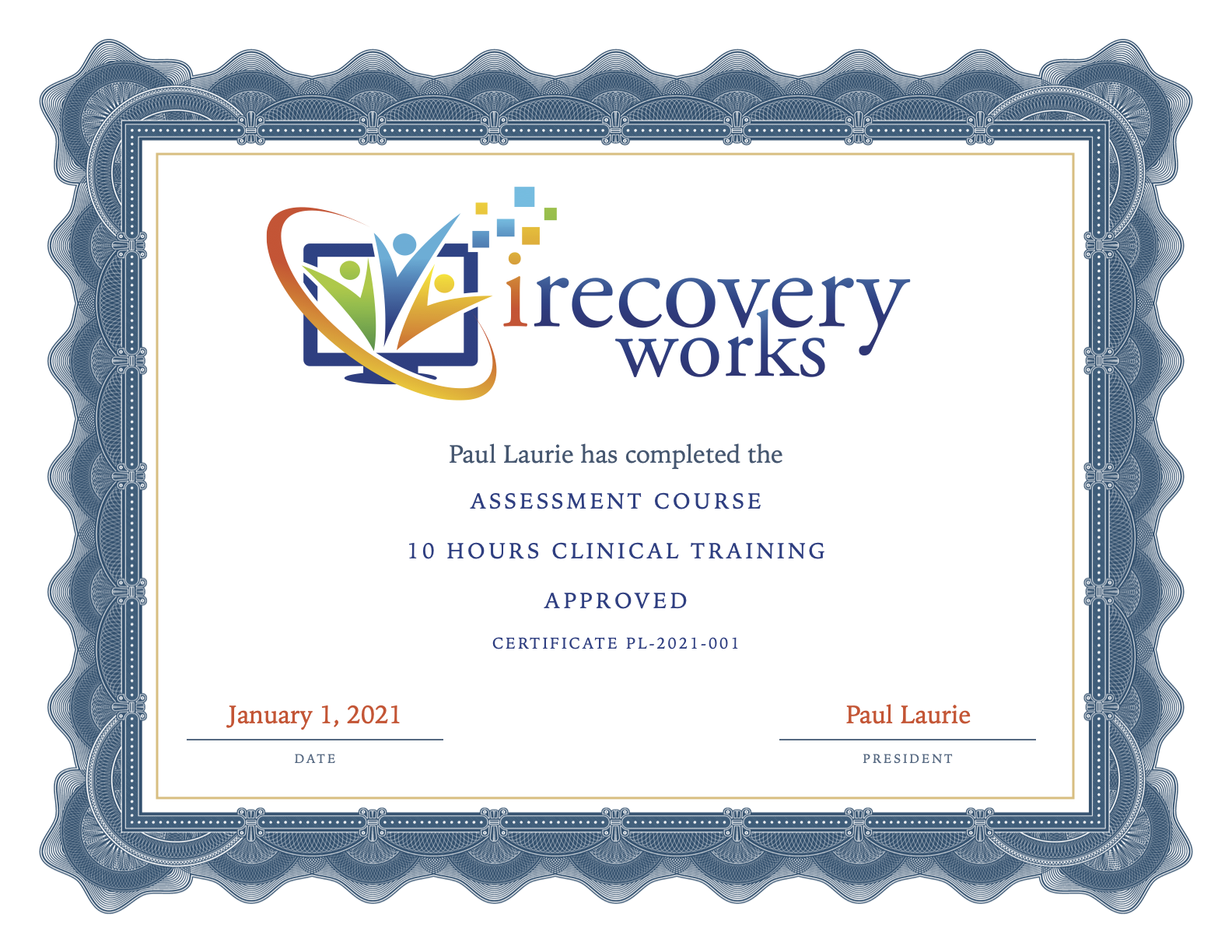Courses
Assessment
Assessment Course
iRecovery Works has developed a 9 session course with a 25 question multiple choice exam as the student testing component. Our aim is to provide counsellors in need of hours to gain CEU’s to certify or re-certify.
GOAL OF COURSE
To provide counsellors with the knowledge and skills needed to conduct a thorough and comprehensive substance use assessment of clients who have issues with alcohol and other substances.
CACCF APPROVED 10 HOURS-CORE ADDICTION
Assessment is the fourth skill listed in the certifications manual which states:
“Assessment is the procedures by which a counsellor/program identi-fies and evaluates an individual’s strengths, weaknesses, problems and needs for the development of a treatment plan.”
There are five Global Criteria, numbers 12-16, that identify each skill and process for addiction counsellors to demonstrate competence. This course is targeted towards these criteria. The criteria are as follows:
12. Gather relevant history from client including but not limited to al-cohol and other drug abuse using appropriate interview techniques.
13. Identify methods and procedures for obtaining corroborative in-formation from significant secondary sources regarding clients’ alco-hol and other drug abuse and psycho-social history.
14. Identify appropriate assessment tools.
15. Explain to the client the rationale for the use of assessment tech-niques in order to facilitate understanding.
16. Develop a diagnostic evaluation of the client’s substance abuse and any coexisting conditions based on the results of all assessments in order to provide an integrated approach to treatment planning based on the client’s strengths, weaknesses and identified problems and needs.
From the Standards and Certifications Manual, this course is directed toward providing knowledge for the counsellor in the area of 4.2 Skills Expected of the Certified Counsel-lor.
This course is specifically targeting the areas of section
A. Client Assessment and Refer-ral, Sections 1 through 4 and Section B. Counselling, Section 1 and 2.
A. Client Assessment and Referral
1. The ability to complete the client intake process.
2. The ability to initiate and continue the client assessment process.
3. The ability to interpret and assess case records.
4. The ability to develop a treatment plan based upon the client’s needs and strengths.
B. Counselling
1. Demonstrated ability in the appropriate use of communication skills of:
a.) Active listening
b.) Leading
c.) Summarizing
d.) Reflection
e.) Interpretation
f.) Confrontation
g.) Self-disclosure
2. Demonstrated ability to establish an effective counselling relation-ship with the client by demonstrating:
a.) Warmth
b.) Respect
c.) Genuineness
d.) Empathy
e.) Concreteness
f.) Appropriate boundaries
SESSION OUTLINE
1. Introduction to the course.
2. Reviewing the importance of the assessment process and identifying the Global Cri-teria for Assessment from the CACCF website.
3. Developing Rapport
a. Defining what rapport is between counsellor and client
b. Identifying the counsellors responsibilities to create rapport
c. The skills needed to develop rapport
d. Can rapport be rebuilt
4. Using Counselling Skills to facilitate the assessment.
a. Listening and Attending Skills
b. Respect
c. Client Centered Care
d. Empathy
e. Inquiry Skills
f. Transference Issues
g. Self Disclosure
h. Highlighting Discrepancies
i. Immediacy
5. Identify Assessment Tools
a. Alcohol Use Disorder Screening Test (The AUDIT) by World Health Organization
b. Alcohol, Smoking, and Substance Involvement Screening Test (The ASSIST) by World Health Organization
c. DSM V Criteria for substance use disorders
6. Taking a Substance Use History
a. The narrative-one to one interview
b. Dates of first use, frequency, times
c. Family histories
d. Consequences
e. Treatment experiences
f. Social assessment
g. Educational assessment
h. Psychological History
7. Evaluating Stages of Change in Clients
a. Review the Stages of Change Model/Transtheorectical Model (TTM), Prochaska and DiClemente
b. Key Characteristics in Identifying where the client is in the stages of change
8. Diagnostic Evaluation
a. How to synthesis all this information into an assessment
b. Preparing the Clinical Report with Evaluations
c. Clinical Impressions, how to trust your skills
9. Meeting with the Client to Review the Assessment and Goal Planning
a. Using your counselling skills to deliver the information to the client
b. How to create the report for the client once you have reviewed the complete as-sessment
10. Student Testing Component. 25 Multiple choice questions
Lessons
Quiz
Meet Our Teacher

